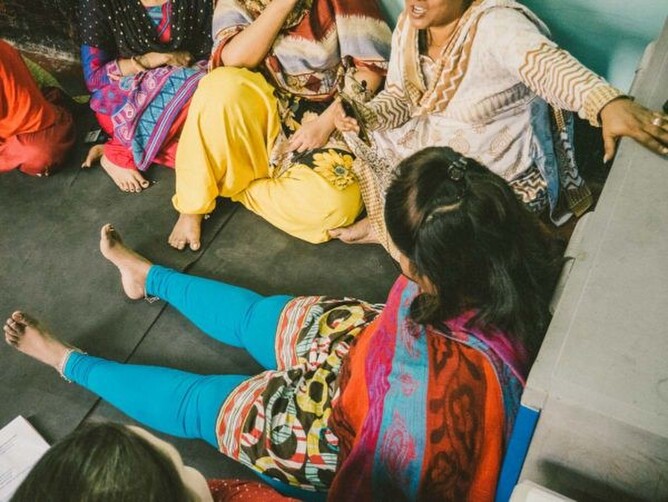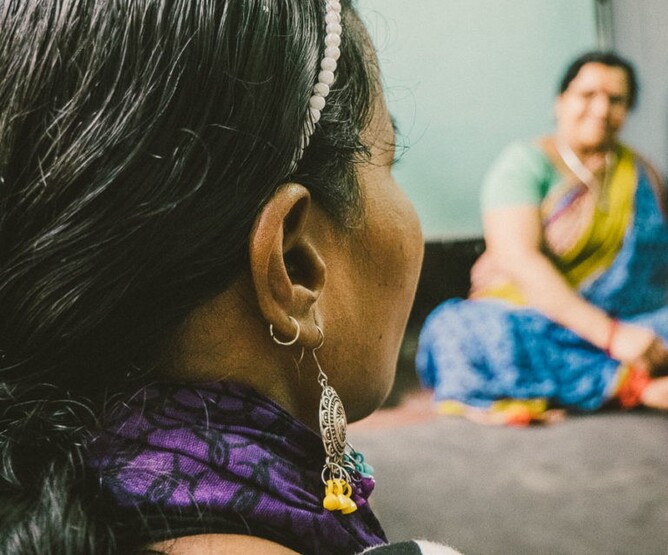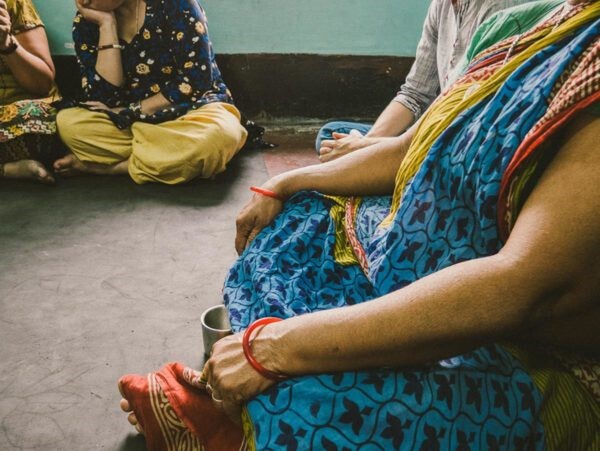By Paul
(This story was originally published by The Loyal Workshop and is republished with permission).
We figured there was no better way to highlight women’s rights, equality and justice within our own community than by bringing together The Loyal Workshop’s women in a round table discussion. We gathered in the uppermost room at the workshop where they shared from their own experiences and perspective about what it’s like to be a woman in Kolkata, India. Here’s what they had to say in their own words!
In this society and neighbourhood what kinds of problems do women face?
Rakhi – The rights of men and women should be exactly the same, along with the respect they get and the behaviour expected of them. The problem is that in our country, the dominant culture states that a woman should stay under a man. That a man can hit her, grab her, or do whatever he wants to her and despite all of this, she has to stay under his control. We learn from birth that you should never speak back to your father, your brother or even your husband. Through our culture, we learn that it’s only through a man’s grace that we are able to survive and live. As far as I’m aware, this way of thinking doesn’t happen in countries where men and women aren’t seen as being so different.
Jona – I think most of the difficulties women face in countries like India and Nepal are directly linked to the struggle to secure a good future for their children. In this battle for a good future, women can easily become trapped. If I had four children, I’d have four extra mouths to feed and four sets of clothes to buy. The expenses rack up quickly and this can lead to women being forced to do anything they can, even if it’s dangerous, for the sake of their children.
Another issue here is the added pressure on girls and women to behave a certain way. If a boy is away from home for an hour or two, no one asks him any questions. Whereas if a woman gets home twenty minutes late the questions flood in from everyone who lives with her: “Where were you? What were you doing? What happened? Why are you so late?”
Kalpana – Women in India receive very little respect. When you walk down the road, it’s quite common to see women begging for money with babies in their arms, all because their husband has discarded them. Women have a lot more pressure placed on them in this society too. For example, after working here today I’ll have to go home and cook for everyone. Men work too, but they don’t have the same levels of responsibility in the home. This is just the way things work here.
Mithu – Women face so many problems here. In our neighbourhood, and in others, women are selling their bodies for just four cents. They worry about where their next meal will come from and how they’ll be able to pay the rent for their brothel room. Their financial situations are terrible. These women are living in constant despair. Because of these kinds of situations, many women here need freedom and growth in their lives.
Kiran – Women here struggle a lot. From my experience, a girl is normally sold into the sex trade by a man who is looking to benefit financially. She’s then passed into the hands of a madam who understands what it’s like to suffer in the sex trade because the same thing has happened to her. However, instead of helping out this girl, the madam hits her, treats her horribly and forbids her to leave the trade. One woman suffers at the hands of another.
When a woman gets married and goes to live with her husband and in-laws, the mother-in-law abuses her in many ways. One woman suffers at the hands of another.
In my lifetime, I’ve seen women treat other women worse more than men usually do. This is not right; women should look out for other women. If that madam in the brothel was approached by a man trying to sell a girl, she should stand up and say, “No, I won’t buy her, I will help this girl! I will prevent her from having to enter the sex trade like I did. I won’t exploit her; I’ll save her from this man!”
This change has to start with us women.
How is Loyal different in terms of equality?
Rakhi – At my old workplace the behaviour from the men that worked there was terrible, so I left. They didn’t know how to respect women; they spoke to me roughly and undermined my abilities in front of my male co-workers.
Mithu – In my opinion, Loyal is different from everywhere else because the women who work here hold their heads high. They say, “Here I am proud to be a woman.”
The women here receive a lot of respect and they respect one another a lot. I can say this because I witness it all the time. Paul, one of our bosses, is a man and I’m younger than him. In this culture, that means I am lower than him. He knows these things but he still treats me with respect. Some of the men that work here are younger than me and some of them are older. They do their absolute best to treat us with respect and not cause us any harm. The men here love us like we are their sisters and aunties. At home, I might not get respect all the time but here, I get it all the time. Because of The Loyal Workshop, I hold my head high.
What changes have you seen in our neighbourhood over the last few years in regards to gender equality?
Mithu – There have been a lot of changes in this area for women in the last few years. There are even more women working at freedom businesses, like The Loyal Workshop, Sari Bari, Freeset, and Love Calcutta Arts, as well as with a local NGO called Hamari Muskhan. There are also a number of older ladies working in people’s homes as cooks. There is still sadness in this area, but compared to before a lot has changed. In the building I live in and the one beside it there are now women living there who are doing really well for themselves.
Kalpana – Things have changed in Kidderpore too. It doesn’t seem like a red-light area as much anymore. In fact, yesterday my husband was installing a light outside the door!
Balika – I faced a lot of trouble in past. I used to live in Bow Bazar and things like paying the rent for my room and getting my son to school were a real struggle. After joining The Loyal Workshop, I am doing so well. Each morning now I give thanks to Jesus for what he’s done for me. Long live The Loyal Workshop!
What can we do to see more change in this neighbourhood?
Jona – We’ve received the opportunity to work here at Loyal. When we leave work at the end of the day, we can tell other women about what we do here and about the opportunity we have received. Once they hear about the kind of work we do now they become amazed and say, “There’s that kind of work available?!”
If we spread the word to one woman at a time, then more women will be able to gain freedom. I’ve been able to spread the word and now many women from our area are working in good businesses. I love being able to help other women find work in places that are good for them. If we share about freedom opportunities in this way, looking to help each other, then lots of women will gain the opportunity for freedom.
Mithu – We can help one another. If someone says, “I want to leave the trade and work with your business” I should say, “Great, come along to our workshop and meet the bosses and have a chat with them about what your options could be!” If they come asking for help, I can hold their hand up. This is the kind of help I want to give to other women.
Rakhi – Loyal has been established as a freedom business for women who have worked in the sex trade. After beginning to work here, the women learn love, self respect and gain knowledge about how to live well. We have a few mantras that we say here, and one of them is “Your life has great value.” Now it is time for us to take the lessons we’ve learnt about how to live and distribute them to other women trapped in difficult situations. We need to tell them, “Your life has great value.” It’s time to go out and spread the love we’ve received here.
What are your hopes for women here?
Mithu – Many women here are getting the same level of respect as men now. My hope is that those who want to receive transformation can. I want to say to all the men out there that we are all God’s creation and we all come from our mother’s womb, so we should receive the same amount of respect. What Rakhi said earlier is true, and I wish that those attitudes would be erased. If a girl is born, my hope is that the family will love her a lot and not despise her. My own dad had 6 daughters, and he never disrespected us but instead he loved us as best he could. I’ve seen another man with four daughters. When the fourth came the mother was upset at first but the father said, “I’m so happy to have four daughters!”
Jona – For Nepali women working in the trade in Kolkata and other cities, my hope it that they won’t think they have to stay where they are. They can return to Nepal. They don’t have to be alone, there are places for them to stay and lots of freedom businesses have started in Kathmandu that I’ve visited myself. Sisters, don’t supress the hope within yourself! Let it come out, be brave, take action and whatever concerns you have we can talk about those together!




